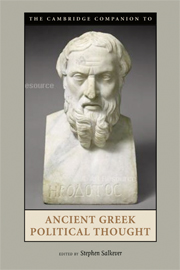Book contents
- Frontmatter
- Introduction
- 1 Homer and Political Thought
- 2 Foundings vs. Constitutions: Ancient Tragedy and the Origins of Political Community
- 3 Most Favored Status in Herodotus and Thucydides: Recasting the Athenian Tyrannicides through Solon and Pericles
- 4 Thucydides and Political Thought
- 5 “This Way of Life, This Contest”: Rethinking Socratic Citizenship
- 6 The Political Drama of Plato’s Republic
- 7 Practical Plato
- 8 Reading Aristotle’s Nicomachean Ethics and Politics as a Single Course of Lectures: Rhetoric, Politics, and Philosophy
- 9 Lived Excellence in Aristotle’s Constitution of Athens: Why the Encomium of Theramenes Matters
- 10 The Virtue Politics of Democratic Athens
- 11 Origins of Rights in Ancient Political Thought
- 12 The Emergence of Natural Law and the Cosmopolis
- Select Bibliography
- Index
6 - The Political Drama of Plato’s Republic
Published online by Cambridge University Press: 28 September 2009
- Frontmatter
- Introduction
- 1 Homer and Political Thought
- 2 Foundings vs. Constitutions: Ancient Tragedy and the Origins of Political Community
- 3 Most Favored Status in Herodotus and Thucydides: Recasting the Athenian Tyrannicides through Solon and Pericles
- 4 Thucydides and Political Thought
- 5 “This Way of Life, This Contest”: Rethinking Socratic Citizenship
- 6 The Political Drama of Plato’s Republic
- 7 Practical Plato
- 8 Reading Aristotle’s Nicomachean Ethics and Politics as a Single Course of Lectures: Rhetoric, Politics, and Philosophy
- 9 Lived Excellence in Aristotle’s Constitution of Athens: Why the Encomium of Theramenes Matters
- 10 The Virtue Politics of Democratic Athens
- 11 Origins of Rights in Ancient Political Thought
- 12 The Emergence of Natural Law and the Cosmopolis
- Select Bibliography
- Index
Summary
The Opening Scene
The first scene of Plato's Republic foreshadows the political questions that the remainder of the dialogue addresses in enormous detail. Socrates has the opening line (which he delivers to an unnamed character): “I went down to the Piraeus yesterday with Glaucon.” The Piraeus was the seaport of Athens, a few miles southwest and lower in elevation than the city proper. Most important, it was the setting of the resistance movement that fought against the Tyranny of the Thirty, the brutal group of Spartan sympathizers who in 404 B.C.E., at the end of the Peloponnesian War, had overthrown the Athenian democracy, which had been proudly in place for a century. The democracy was soon restored (in 403), but the trauma suffered by the Athenians was profound. Plato was twenty-five years old at the time, and at least two of his close relatives (Charmides and Critias) were among the Thirty and their henchmen. (The dialogue, which was probably written around 380, is set in approximately 410.)
- Type
- Chapter
- Information
- The Cambridge Companion to Ancient Greek Political Thought , pp. 156 - 177Publisher: Cambridge University PressPrint publication year: 2009
- 4
- Cited by

